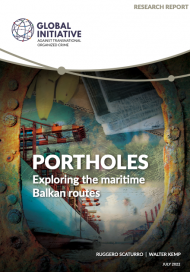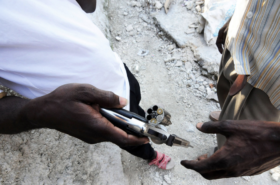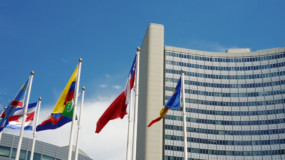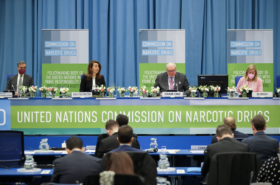Posted on 09 Dec 2022
On 22 November, the UN Security Council met to discuss armed robbery at sea and piracy in the Gulf of Guinea ahead of the ten-year anniversary of the Yaoundé Code of Conduct, which establishes the maritime security framework in West Africa and the Gulf of Guinea.
The issue of piracy and armed robbery has been on the Security Council’s agenda for over ten years. Earlier in 2022, the Council passed resolution 2634, which emphasizes the need to criminalize piracy and armed robbery at sea, and to investigate, prosecute or extradite perpetrators of such crimes, as well as those who finance them. The Council also encouraged bilateral and regional partners to provide help to combat this issue through legal and operational support.
Ahead of the November meeting, the Secretary-General released a report on the situation in the Gulf of Guinea regarding piracy and armed robbery, which indicated a decline in both crimes. Council members recognized improvements while noting the challenges that could lie ahead. Ahead of the tenth anniversary of the Code of Conduct concerning the Repression of Piracy, Armed Robbery against Ships, and Illicit Maritime Activity in West and Central Africa (the Yaoundé Code of Conduct), the report covered the situation in the region over the period January 2021 to August 2022.
The report, presented by Martha Ama Akyaa Pobee, former Ambassador of Ghana to the UN and current Assistant Secretary-General for Africa in the Department of Political and Peacebuilding Affairs, shows a decline in piracy since April 2021. Ambassador Pobee said the decline may have been due to a ‘deterrent effect’ of regularly deployed naval ships, including from Nigeria and regional counterparts, and non-Gulf of Guinea navies as well as piracy convictions seen in Nigeria and Togo in 2021. However, Pobee also said the reported decline in these crimes may have resulted from shifts to new crimes in the region, primarily oil bunkering and theft. This likely shift was echoed by the executive secretary of the Gulf of Guinea Commission, who also cautioned that other forms of crime, such as illegal and unreported fishing, are important to address, as they have a more significant impact on coastal populations and local economies. Nevertheless, despite the decline, piracy causes approximately US$1.9 billion dollars a year in financial losses in the region, according to the UNODC.
Piracy, climate and a blue economy
A recurring topic in the discussion was the link between criminal activities and climate change, and its effect on coastal areas. The Executive Secretary of the Gulf of Guinea Commission highlighted that climate change-related coastal erosion and flooding impact coastal populations, together with governance challenges and lack of basic services. The environmental degradation and loss of biodiversity faced by the region are exacerbated by illegal fishing and extraction of resources, like crude oil. A decline in profitable sources of livelihood in coastal areas because of climate change has made it easier for organized crime groups to recruit young people. Noting how Africa is among the regions that have suffered the brunt of climate change, speakers called for a broad-based approach that includes development and ecological preservation elements. Advancing links to SDGs in the debate, member states, including Norway, Kenya, Germany and Nigeria, called for strengthening blue economies in the region, an equitable and sustainable development approach to oceanic resources.
Anticipating future links with terrorism
On the issue of links to terrorism, Pobee said there is no clear evidence of such a connection, but the report notes that reliance on coastal ports by Sahelian non-state actors, including armed groups and terrorist groups, could lead them to build links in the countries. The UNODC and Mexico recalled recent terrorist attacks in Benin and Togo, expressing that even though piracy is declining, extremism is expanding regionally. Most representatives – including India, Brazil, United Arab Emirates, among others – shared their concern that terrorism is now becoming an issue to tackle in the region. In Africa, transnational organized crime is often linked to terrorism because of the power or governance vacuum in areas where groups operate. Although representatives emphasized that there is no evidence of a direct link, a potential merger of practices seems to have alerted the Council.
A focus on responses
Speakers discussed operational efforts by governments to execute naval exercises and patrols to prevent expansion of piracy in the Gulf and called for more cooperation among regional and international partners, like ECOWAS, the Economic Community of Central African States, the Gulf of Guinea Commission, the European Union and the G7 Group Friends of the Gulf of Guinea. For example, Nigeria discussed its US$195 million Deep Blue Project to improve rapid response to piracy, kidnapping, oil theft, smuggling, trafficking of drugs and persons, and other crimes within its territorial waters. Although the notion of improved patrols in the waters was commended by many states, the need for criminal justice responses in the aftermath of arrests was noted as a remaining challenge. The US noted that fewer than a third of states in the Gulf of Guinea have legislation criminalizing piracy, with many states, including the US, citing the 2021 piracy convictions in Nigeria and Togo as an initial success.
As the ten-year anniversary of the Yaoundé Code of Conduct approaches, the topic of piracy will remain on the UN’s agenda. An implicit call from many in the meeting to expand the agenda to other forms of maritime crime and to monitor links to terrorism indicates an interest in tackling piracy and armed robbery within a wider crime agenda for the region. And repeated calls for responses that include creating blue economies suggest a holistic response, which includes socio-economic components, is also necessary for long-term success in dealing with these forms of crime.



